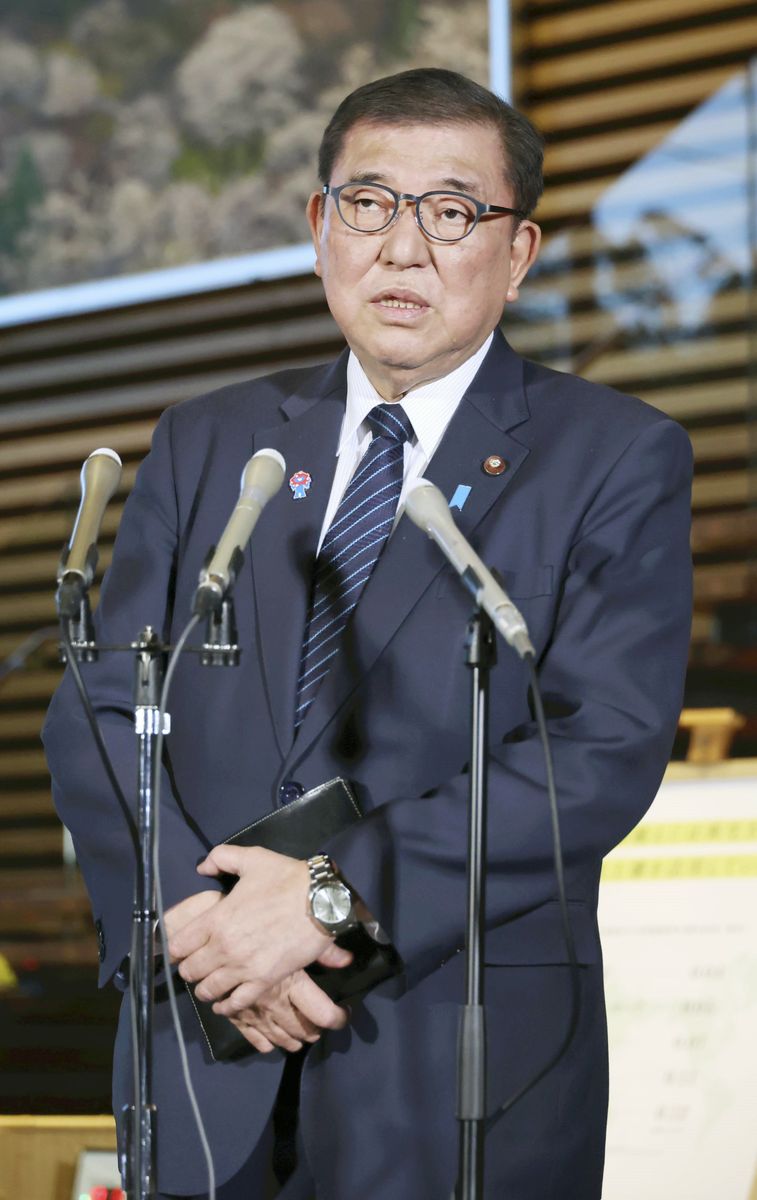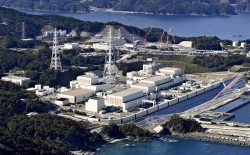Ishiba Seeks Shared Responsibility for Response to Trump Tariffs; Parties’ Leaders Attend Joint Meeting

Prime Minister Shigeru Ishiba answers reporters’ questions about the meeting between the leaders of the ruling and opposition parties, at the Prime Minister’s Office, on Friday.
20:00 JST, April 5, 2025
Prime Minister Shigeru Ishiba, who is also president of the Liberal Democratic party, emphasized the “national crisis” caused by the new U.S. tariff measures at a meeting of ruling and opposition party leaders on Friday.
His reasoning for holding the meeting was to seek shared responsibility among the ruling and opposition parties and deflect criticism of his economic management.
While the opposition parties have demonstrated that they share the sense of crisis and the need for a quick response, they are also wary of being caught up in Ishiba’s pace, as he seeks to ease the confrontational atmosphere.
“I really want to thank the leaders of the opposition parties for their cooperation. We want to face the difficult situation together as a nation,” Ishiba told reporters at the Prime Minister’s Office after the meeting, indicating his intention to continue to listen to the views of the opposition parties as necessary.
The meeting lasted about 50 minutes. At its outset, Ishiba made it clear that the new tariff measures imposed by U.S. President Donald Trump constituted a “national crisis” for Japan. He explained the current policy of response and called for cooperation among party leaders.
Yoshihiko Noda, president of the Constitutional Democratic Party of Japan, Seiji Maehara, coleader of the Japan Innovation Party, and other party leaders, then spoke in turn. They made suggestions such as on how to negotiate with the United States and mobilizing fiscal spending to prepare for an anticipated economic downturn. According to Maehara, Ishiba revealed that he did not know who to talk to in order to get through to Trump.
The decision to hold the meeting was made following advice given by LDP Secretary General Hiroshi Moriyama. In the past, the leaders of the ruling and opposition parties have met as a result of major disasters and other key events. However, it is unusual for such a meeting to focus on diplomacy and trade.
The government’s initial response has been criticized, including for its lack of diplomacy.
“It’s preferable to ease the tension [displayed by the criticism],”said a high-ranking government official.
If the government decides to compile a supplementary budget to support economic measures, the approval of the opposition parties would be essential for the minority ruling coalition. This meeting of party leaders could lay the groundwork for building a consensus.
“I understand that the prime minister has an awareness of the problems and a sense of crisis that he wants to share,” said Noda. However, some members of opposition parties expressed concern. “[Ishiba] probably means that he wants us to cooperate in the running of his administration,” a senior CDPJ member said.
Opposition parties plan to take a more confrontational stance against the government and the ruling coalition in the second half of the Diet session ahead of the upper house election in the summer. Nevertheless, the new tariff measures are expected to hurt domestic industry. “If opposition parties drag the government and the ruling coalition down, criticism could be directed at us,” a high-ranking CDPJ official said.
Depending on how the economic situation evolves, this could influence the opposition parties’ decision to file a no-confidence motion against the Cabinet.
In the 2020 ordinary Diet session, opposition parties did not submit a no-confidence motion, instead prioritizing taking action against the COVID-19 pandemic. The CDPJ intends to determine its response in light of future developments.
Related Tags
Top Articles in Politics
-

Japan PM Takaichi’s Cabinet Resigns en Masse
-

Sanae Takaichi Elected 105th Prime Minister of Japan; Keeps All Cabinet Appointees from Previous Term
-

Japan’s Govt to Submit Road Map for Growth Strategy in March, PM Takaichi to Announce in Upcoming Policy Speech
-

LDP Wins Historic Landslide Victory
-

LDP Wins Landslide Victory, Secures Single-party Majority; Ruling Coalition with JIP Poised to Secure Over 300 seats (UPDATE 1)
JN ACCESS RANKING
-

Japan PM Takaichi’s Cabinet Resigns en Masse
-

Japan Institute to Use Domestic Commercial Optical Lattice Clock to Set Japan Standard Time
-

Israeli Ambassador to Japan Speaks about Japan’s Role in the Reconstruction of Gaza
-

Man Infected with Measles Reportedly Dined at Restaurant in Tokyo Station
-

Man Infected with Measles May Have Come in Contact with Many People in Tokyo, Went to Store, Restaurant Around When Symptoms Emerged


















